Welcome to a new USIH series: Reading Roundup, summer 2022 edition! I read and review dozens of books per year for a website called NetGalley and will share some relevant ones here. You might’ve heard of NetGalley, which is a website that educators and other readers can use to request and receive advanced copies of forthcoming books. Some are published, and others will be published later this year. Here are just eleven of the USIH-adjacent books that I’ve enjoyed this summer. Happy reading!
Eric Alterman, We Are Not One: A History of America’s Fight Over Israel (New York: Basic Books, 2022)
In May 2021, the American discourse around Israel and Palestine felt out of control, and yet, historian Eric Alterman offers an analytical, engaging, measured account of Jewish debates over Israel in the U.S. We Are Not One knows what it is and isn’t: not American foreign policy in the Middle East, not Palestinian experiences, and not a history of Israel. Rather, it’s a careful account of Jewish-American perspectives regarding the world’s only Jewish nation. This well-defined scope enables Alterman to parse out complex issues. While the U.S. gives an unprecedented level of aid and attention to Israel, how can we critique American Israeli relations without succumbing to antisemitic tropes? Nearly a century of Jewish Americans illuminated through Alterman’s historical analyses hold the answers.
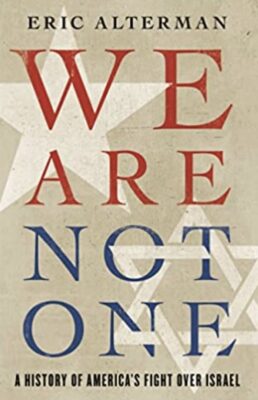
Eric Alterman, We Are Not One: A History of America’s Fight Over Israel (New York: Basic Books, 2022)
Hannah Arendt, Rahel Varnhagen: The Life of a Jewish Woman (John Hopkins University Press, 2000)
Translated by Clara and Richard Winston and read by Suzanne Toren, a new audiobook version of Hannah Arendt’s first postdoctoral project, an analytical biography of Rahel Varnhagen, is now available. Arendt carried around and tinkered with this manuscript for her decade-long exile in France in her twenties during the 1930s. Varnhagen was a late-eighteenth and early-nineteenth century German-Jewish writer. If you’re reading USIH, you might’ve enjoyed Richard King’s reception history Arendt and America and Samantha Rose Hill’s concise biography Hannah Arendt. Rahel Varnhagen as a primary source, now available in engaging enough audio, offers an invaluable lens into Arendt’s early thoughts on Jewishness and womanhood at a time when they shaped her life, too.

Hannah Arendt, Rahel Varnhagen: The Life of a Jewish Woman (John Hopkins University Press, 2000)
David Hackett Fischer, African Founders: How Enslaved People Expanded American Ideals (New York: Simon & Schuster, 2022)
In African Founders, historian David Hackett Fischer explores what he calls nine Afro-European regional cultures in the early U.S., divided into northern regions, southern regions, and frontier regions. Fischer bypasses the popular question of rather the American founding was negative, focusing instead on how African people who arrived via the trans-Atlantic slave trade shaped early American history. He emphasizes, therefore, Black people and communities’ effects on their surroundings.
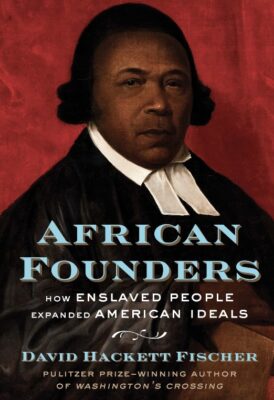
David Hackett Fischer, African Founders: How Enslaved People Expanded American Ideals (New York: Simon & Schuster, 2022)
Elisabeth Griffith, Formidable: American Women and the Fight for Equality (New York: Pegasus Books, 2022)
Trained historian and lifelong educator Elisabeth Griffith synthesizes American women’s political history from the Nineteenth Amendment through the COVID-19 pandemic. Both stunning and subtle, Formidable is noteworthy for its inclusion of information, high quality of writing, and intellectual humility. Put simply, Formidable lives up to its title.
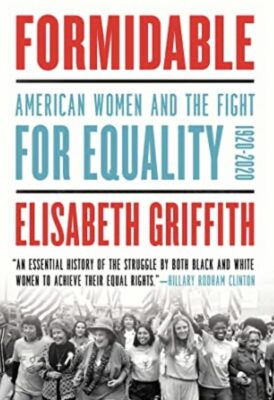
Elisabeth Griffith, Formidable: American Women and the Fight for Equality (New York: Pegasus Books, 2022).
Nicole Hemmer, Partisans: The Conservative Revolutionaries Who Remade American Politics in the 1990s (New York: Basic Books, 2022).In Partisans, historian and journalistic commentator Nicole Hemmer investigates how the purportedly conservative, moralistic Republicans became the “politically incorrect” and “pitchfork” party ready to embrace Trumpism. Hemmer identifies Reagan Republicanism as less of a turning point and more of an ending, followed by an “anti liberalism” that “leaned into the coarseness of American culture.” She focuses on the “partisans” of the 1990s, when they grew to prioritize political victory over any ideology.
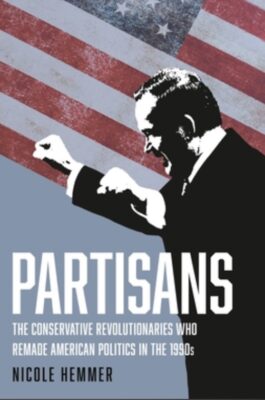
Nicole Hemmer, Partisans: The Conservative Revolutionaries Who Remade American Politics in the 1990s(New York: Basic Books, 2022).
Michael Kazin, What It Took to Win: A History of the Democratic Party (New York: Farrah, Straus and Giroux, 2022)
Georgetown professor and Dissent editor Michael Kazin’s history of the Democratic Party offers pretty much everything that you might need to know or analyze about Democratic Party history from the early republic through the twenty-first century. The chapter that ends in 1932 develops feminists Frances Perkins and Belle Moskowitz as real change makers within the Party. Although Kazin narrows his aims in the introduction, readers might feel like this book covers all. Ultimately, Kazin irons out how the party of enslavers changed slowly, yet dramatically over time.
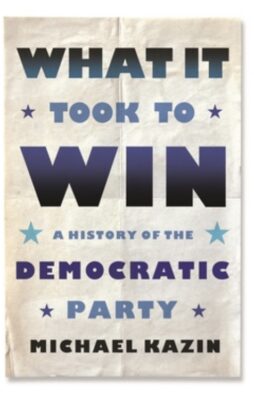
Michael Kazin, What It Took to Win: A History of the Democratic Party (New York: Farrah, Straus and Giroux, 2022)
Derek Leebaert, Unlikely Heroes: Franklin Roosevelt, His Four Lieutenants, and the World They Made (New York: St. Martin’s Press, 2023)
Technology executive and foreign policy professor Derek Leebaert takes on President Franklin Roosevelt’s administration through the lens of four Cabinet Secretaries whose influence spanned FDR’s presidency. It covers Harry Hopkins, Harold Ickes, Henry Wallace, and arguably the most compelling figure: Frances Perkins. Leebaert claims that these four figures wielded the most power in FDR’s administration and that their offices were more powerful than they would be today.
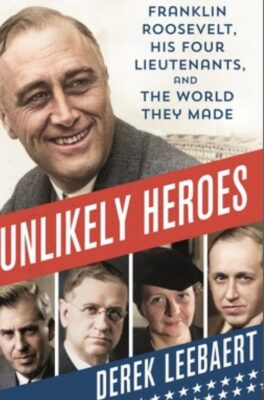
Derek Leebaert, Unlikely Heroes: Franklin Roosevelt, His Four Lieutenants, and the World They Made (New York: St. Martin’s Press, 2023)
Glory Liu, Adam Smith’s America: How a Scottish Philosopher Became an Icon of American Capitalism(Princeton University Press, 2022)
Political scientist Glory Liu’s monograph Adam Smith’s America traces reception of Adam Smith in the United States throughout American history. Liu argues that how time and place influence how readers interpret a text become part of that text’s history. By doing so, Liu makes a strong case for reception history, which she explained for USIH in 2019. Reception history helps to prevent the abuse and misuse of historical thinkers like Smith by political actors neglecting to situate their heroes in proper context. Rather than attempting to “save” Smith, however, Liu brilliantly traces how and why American interpretations of the Scottish philosopher changed over time.
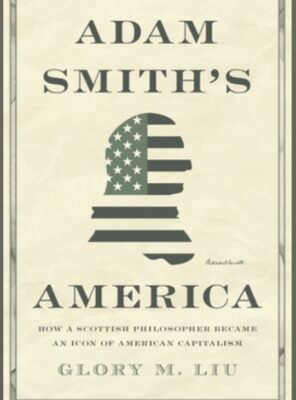
Glory Liu, Adam Smith’s America: How a Scottish Philosopher Became an Icon of American Capitalism(Princeton University Press, 2022)
Natalia Mehlman Petrzela, Fit Nation: The Gains & Pains of America’s Exercise Obsession (University of Chicago Press, 2022)
History professor and fitness instructor Natalia Petrzela combines her vocations in her second book, Fit Nation, which fuses extensive primary research and thorough engagement with secondary literature to offer the first complete history of American fitness culture. The book engages so deeply with American culture and politics that it could effectively serve as a textbook for twentieth-century history of the U.S. It’s also very long: four hundred pages. Perhaps what’s most outstanding about Fit Nation is that during a key moment for history and ‘the public,’ while most scholars yearn to translate academic history for ‘the public,’ Petrzela actually applies a rigorous academic lens to everyday people and daily life. By doing so, she bridges distance between historians and the ‘public’ better than most can imagine.
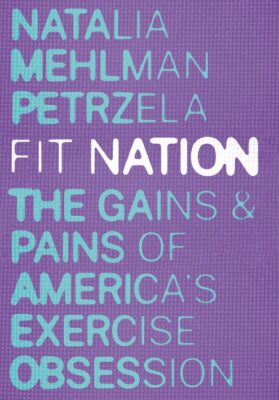
Natalia Mehlman Petrzela, Fit Nation: The Gains & Pains of America’s Exercise Obsession (University of Chicago Press, 2022)
Michael Twitty, Koshersoul: The Faith and Food Journey of an African American Jew (New York: Amistad Press, 2022)
Like his award-winning book The Cooking Gene, Michael Twitty’s new book Koshersoul is really something special. He analyzes Black perspectives, Jewishness, and their intersection, all through the lens of food and through his personal experiences as a queer Jew of color. Twitty’s writing epitomizes the fusion of cultural commentary, personal experiences, and sophisticated research.
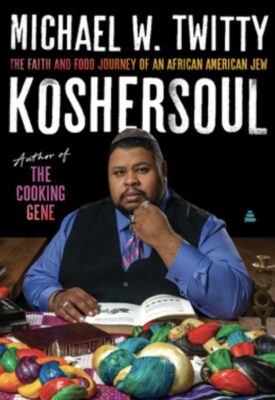
Michael Twitty, Koshersoul: The Faith and Food Journey of an African American Jew (New York: Amistad Press, 2022)

One Thought on this Post
S-USIH Comment Policy
We ask that those who participate in the discussions generated in the Comments section do so with the same decorum as they would in any other academic setting or context. Since the USIH bloggers write under our real names, we would prefer that our commenters also identify themselves by their real name. As our primary goal is to stimulate and engage in fruitful and productive discussion, ad hominem attacks (personal or professional), unnecessary insults, and/or mean-spiritedness have no place in the USIH Blog’s Comments section. Therefore, we reserve the right to remove any comments that contain any of the above and/or are not intended to further the discussion of the topic of the post. We welcome suggestions for corrections to any of our posts. As the official blog of the Society of US Intellectual History, we hope to foster a diverse community of scholars and readers who engage with one another in discussions of US intellectual history, broadly understood.
Rebecca,
Thank you for this.
I was aware of a couple of these, but haven’t read any of them. Leebaert’s subtitle strikes me as unimaginative and a rip-off of Thomas and Isaacson’s The Wise Men: Six Friends and the World They Made. (Of course titles and subtitles are not copyrightable so any author may use any title he or she wants. But one may still criticize them.)